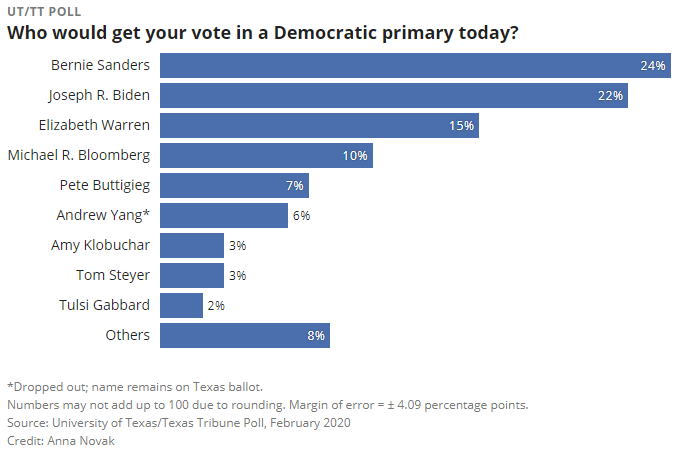This is Bernie Sanders’ best poll result in Texas so far.
U.S. Sen. Bernie Sanders has doubled his support among Democratic voters in Texas and now leads the race for that party’s presidential nomination in Texas, according to the latest University of Texas/Texas Tribune Poll.
Sanders had the support of 24% of the self-identified Democratic primary voters in the poll, up from 12% in October. Sanders passed both former Vice President Joe Biden and U.S. Sen. Elizabeth Warren, the two leaders in the October 2019 UT/TT Poll. Early voting in the Texas primaries starts on Tuesday; election day — Super Tuesday — is March 3.
The field of candidates has changed since the earlier survey. Beto O’Rourke, who was third in October, has dropped out of the race. And Michael Bloomberg, who entered the contest late, landed fourth in the newest poll, ahead of Pete Buttigieg and U.S. Sen. Amy Klobuchar, the second- and third-place finishers in this week’s New Hampshire primary. Warren finished fourth in that contest, with Biden fifth.
Andrew Yang, who dropped out of the presidential race this week, was behind Buttigieg and ahead of Klobuchar in the latest UT/TT Poll.
“Most of the movement has been Sanders and Bloomberg, with Biden [holding] still,” said Joshua Blank, research director for the Texas Politics Project at the University of Texas at Austin. “To be unable to increase his vote share is pretty telling for Biden.”
While Biden’s support was static, Sanders was surging in Texas, and Bloomberg was rising on the strength of millions of his own money spent on advertising after a late start.
See here for more on the October UT/Trib poll. In the other two recent polls we’ve had, Biden led Bernie by two (Lyceum) and Biden had a commanding lead over Bernie (UT-Tyler). This poll was conducted from Jan. 31 to Feb. 9, so perhaps it better captures any momentum or friction that these candidates may have had following Iowa and New Hampshire. There’s a lot of moving parts so it’s hard to isolate any one factor, but the evidence now says that Sanders is in a stronger position in Texas than he had been before.
As for the general:
A slight majority of all Texas voters — 52% — said they would not vote to reelect President Donald Trump in November. Republicans remain solidly in his corner: 90% said they would vote to reelect Trump, including 80% who said they “definitely” would do so. Democrats feel just as strongly: 93% said they would not vote for the president’s reelection, including 88% who would “definitely not” vote for him. Independent voters were against reelection, but less so: 38% said they would vote to reelect Trump, while 62% said they would vote against him.
“With Trump at the top of the ballot, in congressional and legislative races where candidates are running with margins of 5% or less, where the independent [voters] go could become a factor,” Henson said. “It adds uncertainty to those races.”
But when pitted against some of the top Democrats in hypothetical head-to-head contests, the president topped them all, if somewhat narrowly. Trump would beat Sanders by 2 percentage points, 47%-45%, within the poll’s margin of error. He’d beat Biden 47-43, Warren 47-44, Bloomberg 46-41, Buttigieg 47-42, and Klobuchar 46-41. Trump had 45% support against Yang’s 43%. The president, whose reelect number was under 50% in the survey, didn’t get a majority of the vote in any of the matchups, even while getting more support than each Democrat.
“The Trump trial ballots confirm what we’ve seen, that Trump is winning, but he clearly is under-performing, given the party profile in the state,” said Daron Shaw, a government professor at UT-Austin who co-directs the poll. “It is interesting when you put a flesh and blood Democrat up there, it drops that number, but here’s a Republican in a Republican state who’s not at 50%, which is a sign of weakness.”
That’s pretty much what I’ve been saying all along. For what it’s worth, Sanders was the closest competitor to Trump in the October UT-Trin poll, trailing him by five points, 45-40. Biden trailed 46-39, then-still-a-candidate Beto was down 47-41. We’ve seen these results all over the place as well, and it’s just as hard to isolate any reasons for the movement of one candidate or another. What has been consistent has been Trump’s inability to get and stay above fifty percent, as well as his mediocre approval levels and the significant “will not vote for him” totals. Again, I say compare to 2012 when Mitt Romney had a consistent double-digit lead on President Obama, who never got higher in the polls than the 42% he eventually received. We’re still early and the Democratic primary is still unsettled, but it’s clear the Republicans have reason to be worried. The Texas Signal has more.


That is about high Sanders can go, about 25% of people who identify themselves as Democrats.
Republicans have absolutely no reason to be worried. Democrats are going broke just trying to fight off one another and it’s still way to many. Biden is being smart in saving for the big vote in November but he’s also risking losing the nomination now. Bernie has totally given up the whole grassroots thing, and moderate Democrats do not want his radical politics. Whoever does get nominated would be crushed by Trumps money alone. Democrats should be most worried considering a Biden nomination would lead to the Millennial Fallout & Sanders one would lead to a moderate exodus both huge factions of the parties base.
Pingback: Five questions for the primary – Off the Kuff
Pingback: UH poll: Biden, Bernie tied – Off the Kuff